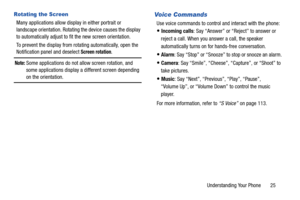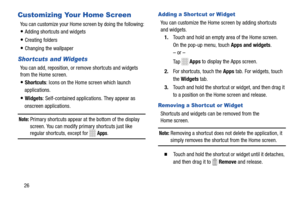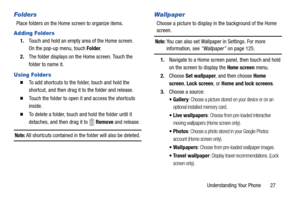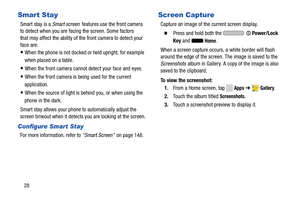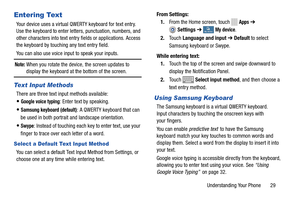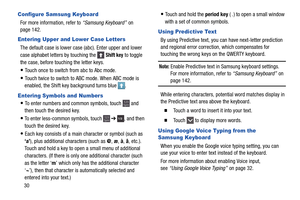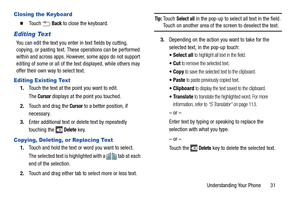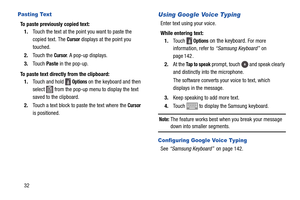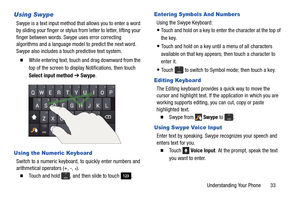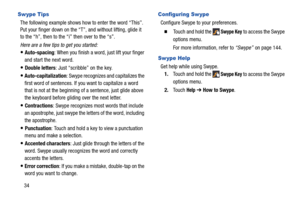Samsung Galaxy S4 Mini User Manual
Here you can view all the pages of manual Samsung Galaxy S4 Mini User Manual. The Samsung manuals for Cell Phone are available online for free. You can easily download all the documents as PDF.
Page 31
Rotating the Screen Many applications allow display in either portrait or landscape orientation. Rotating the device causes the display to automatically adjust to fit the new screen orientation. To prevent the display from rotating automatically, open the Notification panel and deselect Screen rotation. Note: Some applications do not allow screen rotation, and some applications display a different screen depending on the orientation. Voice Commands Use voice commands to control...
Page 32
Customizing Your Home Screen
You can customize your Home screen by doing the following:
• Adding shortcuts and widgets
• Creating folders
• Changing the wallpaper
Shortcuts and Widgets
You can add, reposition, or remove shortcuts and widgets
from the Home screen.
• Shortcuts : Icons on the Home screen which launch
applications.
• Widgets : Self-contained applications. They appear as
onscreen applications.
Note: Primary shortcuts appear at the bottom of...
Page 33
Folders Place folders on the Home screen to organize items. Adding Folders 1. Touch and hold an empty area of the Home screen. On the pop-up menu, touch Folder. 2. The folder displays on th e Home screen. Touch the folder to name it. Using Folders � To add shortcuts to the folder, touch and hold the shortcut, and then drag it to the folder and release. � Touch the folder to open it and access the shortcuts inside. � To delete a folder, touch and hold the...
Page 34
Smart Stay Smart stay is a Smart screen features use the front camera to detect when you are facing the screen. Some factors that may affect the ability of the front camera to detect your face are: • When the phone is not docked or held upright, for example when placed on a table. • When the front camera cannot detect your face and eyes. • When the front camera is being used for the current application. • When the source of light is behind you, or when using the phone...
Page 35
Entering Text
Your device uses a virtual QWERTY keyboard for text entry.
Use the keyboard to enter letter s, punctuation, numbers, and
other characters into text entry fields or applications. Access
the keyboard by touching any text entry field.
You can also use voice input to speak your inputs.
Note: When you rotate the device, the screen updates to
display the keyboard at th e bottom of the screen.
Text Input Methods
There are three...
Page 36
. Configure Samsung Keyboard For more information, refer to “Samsung Keyboard” on page 142 . Entering Upper and Lower Case Letters The default case is lower case (abc). Enter upper and lower case alphabet letter s by touching the Shift key to toggle the case, before touching the letter keys. • Touch once to switch from abc to Abc mode. • Touch twice to switch to ABC mode. When ABC mode is enabled, the Shift key background turns blue Entering Symbols and Numbers • To...
Page 37
Closing the Keyboard
� To u c h Back to close the keyboard.
Editing Text
You can edit the text you enter in text fields by cutting,
copying, or pasting text. These operations can be performed
within and across apps. Howeve r, some apps do not support
editing of some or all of the text displayed, while others may
offer their own way to select text.
Editing Existing Text
1. Touch the text at the point you want to edit.
The
Cursor displays at the point you touched.
2....
Page 38
Touch the Cursor. A pop
up displays.
To paste text directly from the clipboard:
Touch and h old
.
from the pop
-
up menu to display the text
saved to the clipboard.
Options on the keyboard and then
select
1.
To u c h
informat
ion, r
efer to
“Samsung Keyboard” on
page
142
2. At the
Tap t o s p e a k prompt, touch
and dist
inct
ly into the microphone.
The software converts your voice to text, which
displays in the message.
Pasting Text
To paste previously...
Page 39
Using Swype Swype is a text input method that allows you to enter a word by sliding your finger or stylus from letter to letter, lifting your finger between words. Swype uses error correcting algorithms and a language model to predict the next word. Swype also includes a touch predictive text system. � While entering text, touch and drag downward from the top of the screen to display Notifications, then touch Select input method ➔ Swype . Using the Numeric Keyboard...
Page 40
Swype Tips
The following example shows ho w to enter the word “This”.
Put your finger down on the “T”, and without lifting, glide it
to the “h”, then to the “i” then over to the “s”.
Here are a few tips to get you started:
• Auto-spacing : When you finish a word, just lift your finger
and start the next word.
• Double letters : Just “scribble” on the key.
• Auto-capitalization : Swype recognizes and capitalizes the
first word of sentences. If you want to capitalize a...
